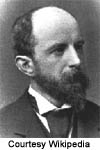 |
→ September 2005 Contents → Column
|
TV News in a Postmodern World:
Chaos at the Door |
 |
|
When historian Henry Adams attended the Paris Exposition in 1900, he had an epiphany that struck his midsection like a body blow from a heavyweight boxer. He suddenly realized that all his background and training hadn't prepared him for the shift from an agricultural age to one birthed in technology. At the age of 62, life had passed him by, and so he wrote the lament, "The law of nature is change (chaos), while the dream of man is order."
He later wrote, "Chaos often breeds life when order breeds habit," and this is a great lesson for us as we confront, once again, the pain of change. Chaos is stirring, and new ideas are bubbling up from the bottom, while the ordered, top-down culture we've created is hanging on for dear life. Nowhere is this more evident than in the world of journalism, where mid-career workers are beginning to share Adams' gut-wrenching revelation.
It can be seen in the halls of journalism education. Several institutions are exploring new ways of teaching journalism in an attempt to save the profession - including a group that met last week on the campus of Ball State University in Muncie, Indiana. But in some ways, these are the last people who should be exploring what to do, because a part of their reason for being is maintaining their "habits" of order. And that's a bigger problem than it appears.
Near the end of the Ball State think tank, an idea was considered that involved inviting mid-career journalists to the University for mentor/protégé sessions where students would be the mentors. It was felt that this might be a good way to bring experienced journalists out of the Adams' quandary.
A very bright student that was present raised his hand and asked, "Why would I want to do that, when I'm essentially competing with these people for jobs?" In a blog comment later, the student, Adam Cairns, wrote:
The larger problem at issue is the number of mid-career journalists in decision-making positions who haven't maintained their tech skills and haven't kept up with internet trends. Asking a student to give them the Cliffs Notes version of what has been happening in the world the past 10-15 years is sad. Rather than wasting time training editors and publishers about the benefits of the internet, mid-career journalists should start listening to their younger colleagues or interns and acting upon their youthful recommendations. Then maybe newspapers would be closer to where they should be by now.
While that's not likely to happen, it's hard to argue with Adam, because in the time it will take to re-equip everybody, new business models will already be thriving in the hands of people who do possess the knowledge. Venture capitalists know this and are beginning to provide funding for start-ups that one day may become the new mainstream in terms of both revenue and jobs.
So let's take a moment to examine what's happening at street level, where the personal media revolution is taking place. Web and politics pioneer, Joe Trippi, made an important observation about it last year:
If information is power, then the Internet, which distributes information democratically to anyone who has access to it, is no longer distributing just information — it's distributing power.
And the paradox of power is that discontent increases with opportunities for acting on it. The more the bottom is given the tools to make and distribute their own media, the greater their power; the greater their power, the greater their discontent and, along with it, the opportunity for acting on that discontent. This bubbling caldron of energy is profoundly anti-elitist and anti-institution, because the more the bottom surveys the landscape these days, the more they realize that our culture has failed them, and this energy is palpable in the halls of power.
Demographer Hazel Reinhardt presented the Ball State group with evidence of what she calls a "Perfect Storm" of demographic and technological changes impacting the culture. Four demographic shifts will have a profound influence on the media.
* The aging of the population * Growing racial and ethnic diversity * The continuing and growing gap between the rich and poor * Metropolitanization/Regionalization She offered one slide of Census Bureau numbers that is the source of much discontent.

Nearly half the income in the U.S. now goes to just twenty percent of the population. Sixty percent of the population gets less than thirty percent of the nation's income. And what is it that sustains this disparity? The order of a modernist way of life. To the institutions go the wealth, one of the most visible being the media.
Ms. Reinhardt pulls no punches in describing her "Perfect Storm."
What does the future hold? Change. The status quo can't be the way forward, for the coming together of profound demographic and technological changes will restructure the media, and we are at the beginning of it. This will be geometrically larger than the advent of television in 1950.
The extent to which the public - in the form of citizens media - can undercut the revenue bases of professional journalism will determine how well institutional media will withstand the onslaught. Since media revenue is audience-driven, however, this is one institution that's headed for the tar pits, because - at core - the advertising industry doesn't really care about things like tradition and history. Where that wealth gets redistributed in the economy is anybody's guess, and that's why the entry of Venture Capitalists into the citizens media game is so significant.
There is one group who could slow this down, of course. They are the keepers of the status quo - the lawyers of the land. And given that institutional lawmakers are mostly lawyers too, well you get the idea. In the end, one has to believe that the people will win, even if it means voting every lawyer out of office. Revolution is like that.
As Ms. Reinhardt noted, no one can really stop the perfect storm. That's why it's important for mid-career journalists to get their hands dirty in using the technology of the personal media revolution instead of thinking about how and where to learn about it. Become a "doer" of the word instead of a "hearer" only. Learning is always accelerated by experience, so those who feel their careers slipping away need to get involved. Start a blog. Build a Web page. Pick up a camera. Play a video game. Get close to young people who are comfortable using technology, and ask questions. Read a book, or better yet, go online and look around for tutorials. They're everywhere. Most of all, don't let fear get in the way. It's only technology. DO something!
Henry Adams would be amazed if he could see what's happened a hundred years after Paris, but he would certainly understand the feelings of mid-career journalists. Perhaps a hundred years from now, when some writer is trying to explain the inevitable shift from holograms to worm holes, he'll come across quotes from those lamenting the loss of order, circa 2005.
© Terry Heaton
|
|
Back to September 2005 Contents
|
|
 If anybody should have seen it coming, it was Adams. His great-grandfather was President John Adams; his grandfather was President John Quincy Adams. He was part of the elite culture - people in the know - and yet there he was, admitting he felt completely lost. Or was it, perhaps, because he was a part of the hierarchical "order" that he missed what was going on beneath him? Regardless, it was likely a horrifying realization.
If anybody should have seen it coming, it was Adams. His great-grandfather was President John Adams; his grandfather was President John Quincy Adams. He was part of the elite culture - people in the know - and yet there he was, admitting he felt completely lost. Or was it, perhaps, because he was a part of the hierarchical "order" that he missed what was going on beneath him? Regardless, it was likely a horrifying realization.